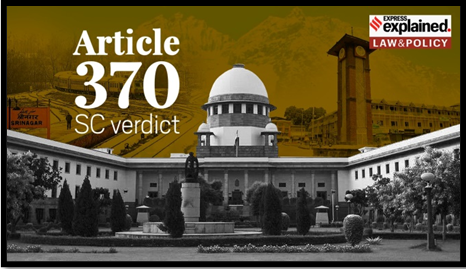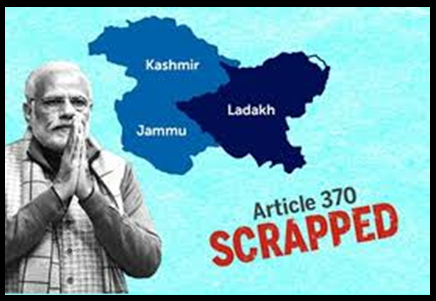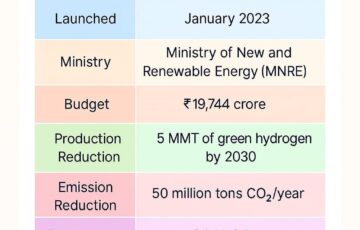SUPREME COURT’S VERDICT ON ARTICLE 370
Why in the News?
- A Constitution Bench of the Supreme Court on Monday unanimously upheld the power of the President to abrogate special status of Jammu and Kashmir under Article 370 of the Constitution.
Source: Th Indian Express
Upholding Presidential Power
- Reorganisation Outcome: Division of Jammu and Kashmir into two Union Territories, and removal of privileges under Article 370.
- Confirmation by Bench: Unanimous agreement on the President’s authority to nullify Article 370 via a notification.
Rationale and Presidential Authority
- Unilateral Presidential Action: Court’s affirmation of the President’s capability to issue a notification abolishing Article 370 based on “special circumstances.”
- Limitation of Court’s Role: Court clarified its inability to contest the President’s decision regarding the existence of these circumstances.
Historical Context and Integration Efforts
- Integration Efforts: Acknowledgment of a 70-year gradual collaboration between the Centre and Jammu and Kashmir towards constitutional integration.
- Permanent Status Debate: Court dismissed the idea of Article 370 acquiring permanent status post the dissolution of the Constituent Assembly in 1957.
Significance and Constitutional Integration
- Purpose of Article 370: Highlighted as enhancing constitutional integration rather than causing disintegration.
- Revocation Impact: Full application of the Indian Constitution to Jammu and Kashmir after the abrogation of Article 370.
Conclusion
- Non-binding Recommendation: Court’s stance on the non-binding nature of the Constituent Assembly’s recommendation regarding Article 370’s revocation.
- Valid Presidential Action: Recognition of the President’s authority in nullifying Article 370, constituting a valid exercise of power.
Key Aspects of the SC Judgment
Source: The Indian Express
Concurrent Judgments:
- Three concurrent judgments delivered by Chief Justice DY Chandrachud, Justices BR Gavai and Surya Kant, and a concurring opinion by Justice SK Kaul. Justice Sanjiv Khanna concurred with both.
Verdict addressed:
- Validity of Presidential order
- Imposition and extension of President’s rule in Dec 2018
- Constitutionality of J&K Reorganisation Act, dividing the state into two Union Territories (UT).
Validity of President’s Rule:
- Court didn’t rule on its validity as not challenged by petitioners.
- Emphasized limits on Union’s power during this period, rejecting arguments challenging irreversible actions.
J&K’s Sovereignty Clarification:
- Affirmed J&K lacked internal sovereignty post-accession to India.
- Highlighted absence of sovereignty references in J&K Constitution, confirming its integration with India.
Article 370’s Temporariness:
- Ruled Article 370 as temporary with textual evidence and marginal notes indicating its transitory nature.
- Stressed it was part of a gradual process of constitutional integration.
President’s Powers and Constitutional Order:
- Upheld President Kovind’s move issuing Constitutional Order (CO) 273, revoking J&K’s special status.
- Stated Constituent Assembly’s recommendation wasn’t binding on the President.
Status of Ladakh and Reorganisation Act:
- Didn’t determine the validity of J&K’s division into a UT.
- Upheld Ladakh’s separation as a UT, considering Solicitor General’s submission on statehood restoration.
Court Orders:
- Directed Election Commission for J&K assembly elections by Sep 30, 2024.
- Called for earliest restoration of statehood.
- Justice SK Kaul suggested a “Truth and Reconciliation Committee” for addressing human rights violations.

 Source: Th Indian Express
Source: Th Indian Express Source: The Indian Express
Source: The Indian Express


